ISSN ONLINE(2320-9801) PRINT (2320-9798)
ISSN ONLINE(2320-9801) PRINT (2320-9798)
JaychandUpadhyay1, Namita Devadiga2, Alrina D’mello2, Glenie Fernandes2
|
| Related article at Pubmed, Scholar Google |
Visit for more related articles at International Journal of Innovative Research in Computer and Communication Engineering
This paper presents the design and modelling of a GSM-based Energy Recharge System for prepaid Metering.The present system of energy billing in India is error prone and also time and labour consuming. Errors getintroduced at every stage of energy billing like errors with electro-mechanical meters, human errors, processing errors. The aim of the project is to minimize the error by introducing a new system of Prepaid Energy Metering using GSM. The GSM module provides a mode of communication between the user/ and provider. This will enable the user to recharge his/her electricity account from home. We can easily implement many add-ons such as energy demand prediction, real time dynamic tariff as a function of demand and supply and so on.
KEYWORDS |
| Energy meter, GSM technology, Microcontroller AT89S52, Prepaid Card, Relay, Putty Software. |
I. INTRODUCTION |
| GSM technology is used so that the consumer would receive messages about the consumption of power (in watts) and if it reaches the minimum amount, it would automatically alert the consumer to recharge. This technology holds good for all electricity distribution companies, private communities, IT parks and self-containing housing projects. The development of GSM infrastructure in past two decades made meter reading system wireless. The GSM infrastructure, which has national wide coverage can be used to request and retrieve power consumption notification over individual houses and flats. Apart from making readings using GSM communication, billing system is needed to be made prepaid to avoid unnecessary usage of power. It replaces traditional meter reading methods and enables remote access of existing energy meter by the energy provider. Also they can monitor the meter readings regularly without the person visiting each house. |
II. RELATED WORK |
| Mr. Nazir Bin Abdullah [1], developed an automatic meter reading system (Automation of ResidentialElectricity Cut off Using Embedded Controller). In 2012 for domestic user. In this project he used GSMmodem for transmitting and receiving information, both sides means user side and energy provider side. Mr. Hung Cheng Chen [2] proposed a wireless automatic meter reading system in 2012. In thisproject he used ZigBee module on both sides. This technology is chip and low cost. Mr. Alauddin Al –Omary[3] develop an automatic meter reading system using GPRS technology. In 2011. MR.LI Quan Xi [4] design an automatic meter system based on ZigBee and GPRS system. In 2010. Mr. H.G..Rodney Tan [5] develop an automatic power meter reading system using GSMnetwork.in 2007.In this system GSM digital power meter installed in every consumer unite and electricity ebillingsystem at the energy provider side. Mr. MejbauiHaque [6] develop a microcontroller based single phase digitalprepaid energy meter for improved meter and billing system. Amit Jain [7], proposed a prepaid meter using mobilecommunication in2011.In this system he used controller unite, prepaid card and communication module. Fawzi Al-Naina and Bahaa Jalil[8],Built a prototyping prepaid electricity meter system based on RFID .Thissystem is divided into two part such as client and server .The client consist of a digital meter based on amicrocontroller and an RFID reader and the server consist of a PC with MySQL database server. The client installedin each house and the server installed in local substation. |
III. LITERATURE SURVEYED[3] |
| Automatic Power Meter Reading and Distribution Control Using GSM Networks, mainly focussed on measurement of power from the consumer side that has been consumed by them. It is an integration of single phase class T, IEC61036 Standard Compliance Digital KWh Power Meter, Power to Communication (P2C) interface board and a GSM modem which utilise the GSM network to send the power usage reading back to energy provider wirelessly. The system mainly focuses on taking to an account of power consumed by the user .The digital power meter is used to measure the power consumption drawn from the energy provider substation to the consumer in KWh unit. A single phase digital Watt Hour Meter ATEC12and ATEC was chosen for GSM Power meter implement the system consists of optocoupler instead of Electromagnetic Relay which may require a step down transformer to transfer the amount of power consume and will also, result in complexity in circuit. The Power to Communication (P2C) is used to interface the impulse and synchronisation count from the power meter optocoupler circuit and to store the power meter reading into the internal non EEPROM memory at single impulse count interval. In the case of power failure the last meter reading will be stored in EEPROM.During the time of power restoration the microcontroller circuitry used here retrieves back last meter reading and to continuous synchronous with the digital power meter. At the time of normal operation the Power to Communication interface board used to retrieve the last meter reading from the EEPROM memory. Here the GSM Power Meter and SMS Gateway uses normal SIM card phone number. The billing notification to customer send by SMS, E-mail and hardcopy printing for postal. The complete demonstration of GPMDC from meter reading, notification, payment, distribution control of power cut-off and power restoration are being done. |
IV. EXISTING SYSTEM |
| In existing system either an electronic energy meter or an electro-mechanical meter is fixed in the premise for measuring the usage. The meters currently in use are only capable of recording kWh units. The kWh units used then still have to be recorded by meter readers monthly, on foot. The recorded data need to be processed by a meter reading company. For processing the meter reading, company needs to firstly link each recorded power usage datum to an account holder and then determine the amount owed by means of the specific tariff in use. |
V. PROPOSED SYSTEM |
| The present power usage reading is made manually by moving to the consumer locations. This requires large number of labour operators and long working hours to accomplish the task. Manual billing is sometimes restricted and delayed by bad weather conditions. The printed billing also has the tendency of getting lost. Over the last few years, Smart (Prepaid) Energy Meter has been proposed as an innovative solution aimed at facilitating affordability and reducing the cost of utilities. This mechanism, essentially, requires the users to pay for the electricity before its consumption. In this way, consumers hold credit and then use the electricity until the credit is exhausted. If the available credit is exhausted then the electricity supply is cut-off by a relay. Readings made by human operators are prone to errors. This project addresses the above mentioned problems. The development of GSM infrastructure in past two decades made meter reading system wireless. The GSM infrastructure, which has national wide coverage, can be used to request and retrieve power consumption notification over individual houses and flats. Apart from making readings using GSM communication, billing system is needed to be made prepaid to avoid unnecessary usage of power. The use of Prepaid Energy meter is still controversial. On the one hand, those that support the diffusion of prepaid meters claim that they benefit both consumers and utilities because they help users to consume more efficiently and to improve the management of their budget, while allowing firms to reduce financial costs. |
VI. WORKING |
| The proposed model has the PIC microcontroller as Central Processing Unit. The whole system is interfaced with PIC microcontroller. The GSM modem is serially connected with the controller which is the major communication module between User and provider. The GSM uses its own network for the transfer of information. Special coding in embedded c is used for programming PIC microcontroller using programmer Hardware along with MP-LAB IDE software. The relay acts as switching device to cut off and restore power supply. The LCD is interfaced to microcontroller using parallel port connection. In this project the Microcontroller based system continuously records the readings and the live meter reading can be sent to the Electricity department on request. This system also can be used to disconnect the power supply to the house in case of non-payment of electricity bills. A dedicated GSM modem with SIM card is required for each energy meter. The microcontroller pulls the SMS received by phone, decodes it, recognizes the Mobile no. and then switches on the relays attached to its port to control the appliances. After successful operation, controller sends back the acknowledgement to the user’s mobile through SMS. The coding emphasis the fact that it reduces human labour but increases the efficiency in calculation of bills for used electricity .the user will have an universal number and they can recharge outlets of electricity board .the acknowledgement of recharged coupon detail will come to notice of the consumer and also will get displayed in LCD module. So this process will bring a solution of creating awareness on unnecessary wastage of power and will tend to reduce wastage of power. This module will reduce the burden of energy providing bye stablishing the connection easily and no theft of power will takes place. The LCD display will display the used amount and balance amount that can be used. |
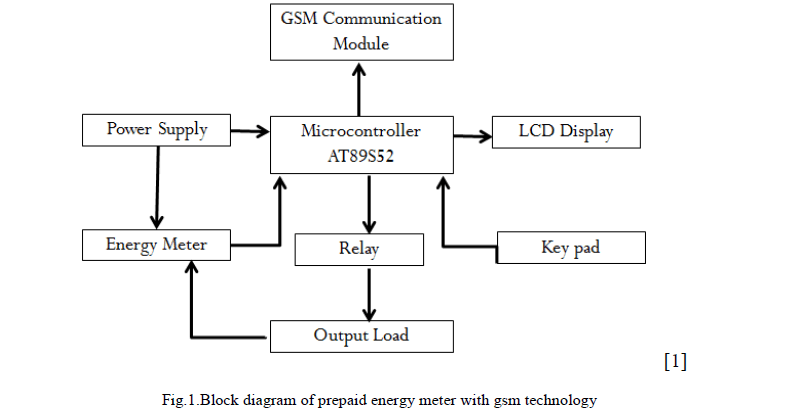 |
VII. ALGORITHM[8] |
| Step 1:Start the program. |
| Step2:Interface the LCD and the Keypad to the PIC Microcontroller. |
| Step 3: Initializing the LCD. |
| Step 4: Enter the card number. |
| Step 5:Configure the GSM and send number to the service provider. |
| Step 6: If the number is valid then receive the recharged amount from the service provider. |
| Step 7: If the number is invalid then enter the correct number. |
| Step 8: When the electricity is consumed, then the recharged amount will get decremented. |
| Step 9: When 80% of the recharged is consumed, then the user will get a warning message to recharge the Energy Meter. |
| Step 10: When the recharged money gets over, the relay cut-off the household power supply. |
| Step 11: Stop the program. |
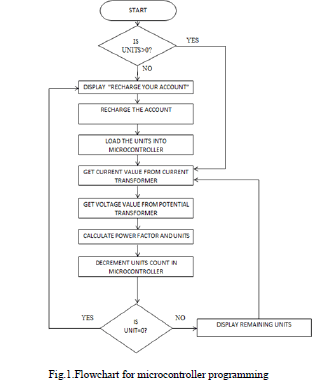 |
VIII. RESULTS AND DISCUSSION |
| STEP1:For interfacing the GSM modem with the computerwe are using the PUTTY software. It is used to create the hyper terminal window in Windows 7 OS. After installing the PUTTY software a window appears where we can select the COM port, then select serial communication for interfacing the GSM modem. After the interfacing is done then a hyper terminal appears in the screen. Using AT commands in this hyper terminal we can operate the MODEM. |
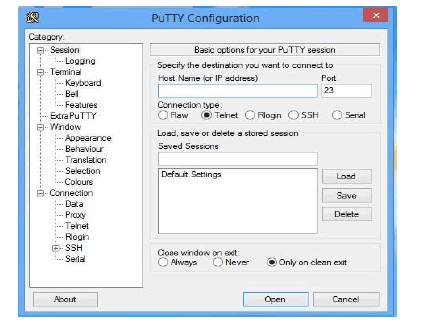 |
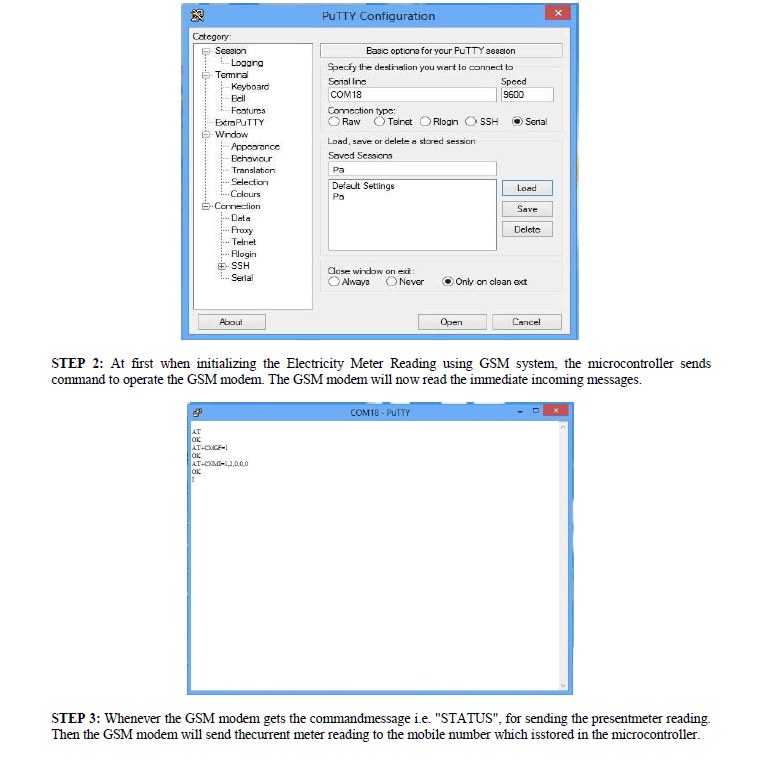 |
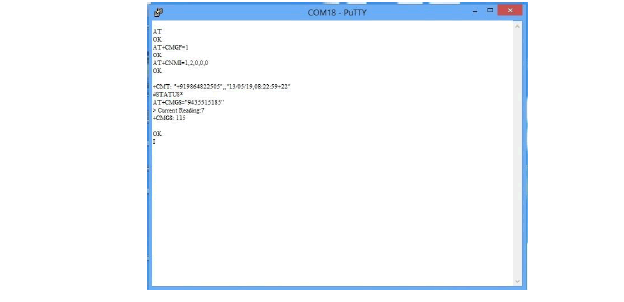 |
IX. FUTURE SCOPE |
| RFID BASED PREPAID ENERGY METERBASIC IDEA: A scheme of Electricity billing system called "PREPAID ENERGY METER WITH TARIFF INDICATOR" can facilitate in improved cash flow management in energy utilities and can reduces problem associated with billing consumer living in isolated area and reduces deployment of manpower for taking meter readings. Every consumer can recharge RFID tag assigned and recharge its meter at various ranges (i.e. Rs 50, Rs 100, Rs 200 etc.).In our project and implementation we have given the name for RFID tag card smartcard. Consumer can check its balance in LCD attached with the module and be prepare for the next recharge in advance. Radio-frequency identification (RFID) is an automatic identification method, relying on storing and remotely retrieving data using devices called RFID tags or transponders. The technology requires some extent of cooperation of an RFID reader and an RFID tag. An RFID tag is an object that can be applied to or incorporated into a product, animal, or person for the purpose of identification and tracking using radio waves. Some tags can be read from several meters away and beyond the line of sight of the reader. An RFID tag is an object that can be applied to or incorporated into a product, animal, or person for the purpose of identification and tracking using radio waves. |
X. CONCLUSION |
| The design of Smart Energy meter using GSM technology can make the users to pay for the electricity before its consumption. In this way, consumers hold credit and then use the electricity until the credit is exhausted. If the available credit is exhausted then the electricity supply is cut-off by a relay. This reduces human labour and at the same time increases the efficiency in calculation of bills for used electricity. Smart energy meters will bring a solution of creating awareness on unnecessary wastage of power and will tend to reduce wastage of power. This module will reduce the burden of energy providing by establishing the connection easily and no theft of power will take place. This paper work exposes the purpose of energy monitoring and controlling by implementing prepaid system. It is hoped that this work helps the consumers for better energy management and its utility in the distribution system for economic liability of the Electrical Boards. |
References |
|